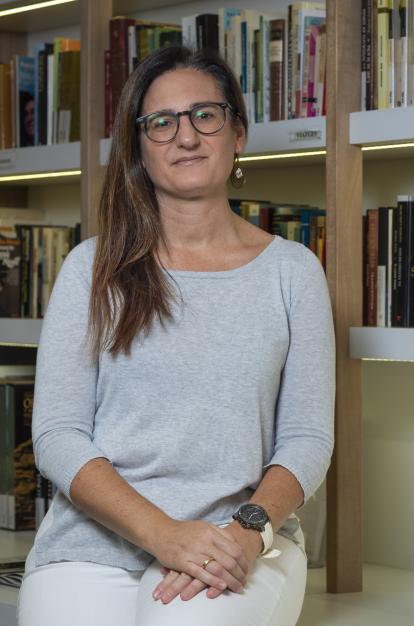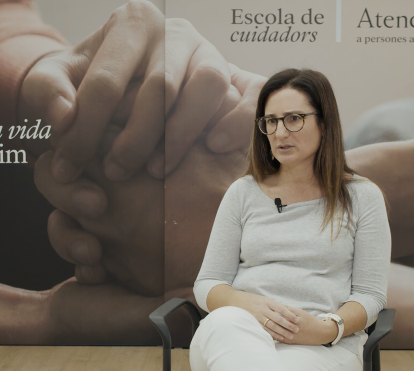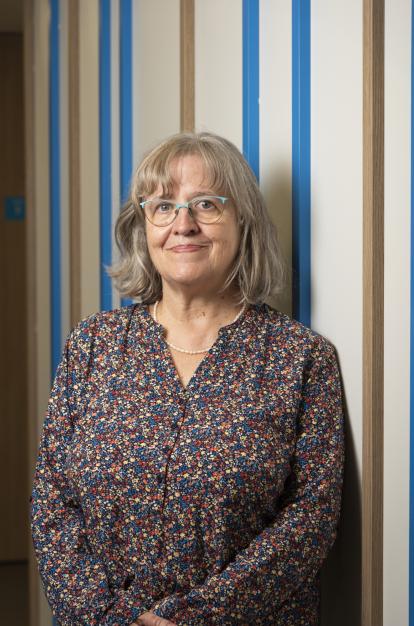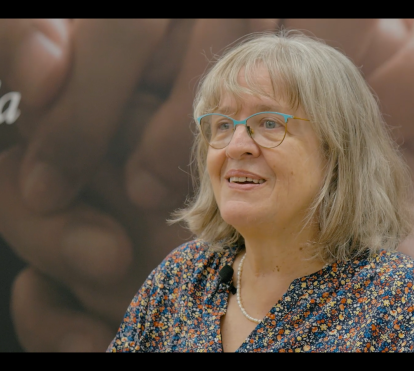
You are reading:

You are reading:

05.11.24
7 minutes readSend your questions to:
Since 2018, the School for Carers of the ”la Caixa” Foundation’s Comprehensive care for people with advanced diseases programme has organised over 2,000 workshops in which nearly 8,000 people have taken part. María Isabel Ortego is one of them. After more than 20 years of caring, first for her parents and now for a friend, a “little bell inside” made her realise that she had to start looking after herself. At the School she has found resources to improve her well-being and to be able to provide better care.
Aimed at family members and volunteers who care for people with advanced illnesses or at the end of life, this pioneering initiative in Spain offers online workshops led by experts who train non-professional carers to improve the quality of life of the people being cared for.
These workshops take a cross-cutting approach to the different aspects of care: from essential physical care to the spiritual and social concerns of the people involved or their emotional and psychological difficulties.
Anna Escolà is a psychologist in a psychosocial care team (EAPS) of the programme for the Comprehensive care for people with advanced diseases. The School for Carers offers workshops led by her on good treatment, as well as others such as “Person and dementia” and “Caring for yourself to care for others”, the latter focused on promoting self-care practices through self-awareness techniques.

“I heard a little bell inside telling me, ‘You’re important too’ and I began to think that life had to be more than just devoting yourself to others. Devoting yourself to others brings satisfaction, but there must always be an element of self-care and enjoyment.” These are the words of María Isabel Ortego, a carer, first for her parents and now for Juan Luis, a close friend she lives with.
For Escolà, common expressions like “what do we do now?” or “where do we go from here?” reveal the most frequent doubts faced by the carers she supports. “Often, that uncertainty becomes a paralysing fear,” she adds. That is why the School for Carers seeks to empower these individuals by providing them with tools, skills and guidelines, as well as information to help them adapt to their new reality.
“Caring is born out of the love you feel for a person who you want to be as well as possible,” says the psychologist. However, it is an exhausting task, and during the caring experience many emotions arise which family carers often face alone. “When a loved one becomes ill, there’s an impact on the whole family system. You have routines and ways of doing things that suddenly fall apart,” she explains. That is why she believes that the guidance offered by the school “helps them a lot to situate themselves in a healthier place,” allowing them to find enjoyment in the care they provide.
Self-care, according to Escolà, is key to fulfilling the role of carer: “It’s very important for these people to understand what they need in order to feel well, so they can better support patients.” Understanding the illnesses they are dealing with, which have ups and downs and relapses, can be crucial. It is also essential to learn how to manage the feelings and tensions that inevitably arise. “Fortunately,” says the psychologist, “today’s children are learning to integrate this emotional aspect of themselves, but many older adults still repress that part because we come from a stoic model.”
The workshops also address the relationship with the person in need of care. “It’s essential to understand the reactions that someone who is ill may have in order to see how the carer can reposition themselves and continue with that support,” says Escolà. According to the expert, it is especially delicate when there is a reversal of roles within family dynamics: “Sometimes the symmetry of roles is broken and the children suddenly become the fathers or mothers. In cases like this, it’s important for the carer to be clear about their limits and to know what resources are available to them to provide good treatment and dignified care.”

It is common for carers to experience feelings of loneliness. “They need to talk about what’s happening to them in order to assimilate the fears that arise when living with the uncertainty of the disease.” Escolà stresses the great benefit for participants of being able to share their own experiences in a space set up at the end of the workshops. “It transforms the faces of both those who speak and those who listen, and the expression of pain is reduced.”

Participants greatly value this space for building networks. “I was looking for a place where I could express myself, where I could get a bit of support and find other people in similar situations,” confirms Ortego. This Argentinian, who has lived in Barcelona for more than 30 years, came to the School for Carers seeking precisely to break out of isolation: “Listening to other experiences is helpful. It makes you realise that it’s not something that only happens to you.”
Moreover, the bonds formed at the School for Carers often extend beyond the workshops. “I’ve kept in touch with some people because there’s a much greater level of understanding, even more than with close friends,” says Ortego.
Supporting a person with an advanced illness is a “mirror experience” which connects us with our own fragility and vulnerability. As Escolà comments, “the situation is overwhelming because we all find it very difficult to bear suffering and pain.”
What we do then is activate avoidance strategies: we try not to think about the end of life until it is imminent. In Catalonia, only 1.6% of the population has registered an advance directives document or living will. “We can’t imagine ourselves living a dependent and limited life. There’s still a lot of work to be done to raise awareness in this area,” says Escolà.
The School advises and trains carers so that they can support people in the final stages of life. As Escolà points out, during this period “it’s very important to support the sick individuals in their decision making and for them to feel listened to.” At the same time, family members are provided with information about the grieving process, which enhances their understanding and promotes emotional expression.

Beyond the enormous personal challenge it represents, for Ortego this stage of end-of-life care has been a life experience that has enriched her: “Caring for older people and helping them make that transition a little more pleasant has also given me something: it enriches you and gives you a sense of purpose.” And the School for Carers has made her work easier: “It has nourished me with knowledge and helped me to improve my attitude and to feel more confident in my reality.”
Since the School for Carers began in 2018, the response from attendees has been very positive. More than 90% of participants would recommend the workshops to people in similar situations. And 95% say they feel more able to provide care after their time at the School. Ortego is in no doubt: “People should be encouraged to take part, because it’s like receiving a dose of vitamins, a push to keep going.”